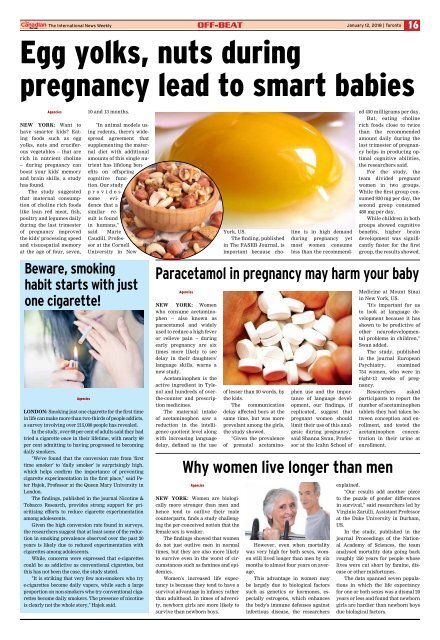You also want an ePaper? Increase the reach of your titles
YUMPU automatically turns print PDFs into web optimized ePapers that Google loves.
<strong>The</strong> International News Weekly OFF-BEAT<br />
January 12, 2018 | Toronto 16<br />
Egg yolks, nuts during<br />
pregnancy lead to smart babies<br />
Agencies<br />
NEW YORK: Want to<br />
have smarter kids? Eating<br />
foods such as egg<br />
yolks, nuts and cruciferous<br />
vegetables -- that are<br />
rich in nutrient choline<br />
-- during pregnancy can<br />
boost your kids' memory<br />
and brain skills, a study<br />
has found.<br />
<strong>The</strong> study suggested<br />
that maternal consumption<br />
of choline rich foods<br />
like lean red meat, fish,<br />
poultry and legumes daily<br />
during the last trimester<br />
of pregnancy improved<br />
the kids' processing speed<br />
and visuospatial memory<br />
at the age of four, seven,<br />
10 and 13 months.<br />
"In animal models using<br />
rodents, there's widespread<br />
agreement that<br />
supplementing the maternal<br />
diet with additional<br />
amounts of this single nutrient<br />
has lifelong benefits<br />
on offspring<br />
cognitive function.<br />
Our study<br />
provides<br />
some evidence<br />
that a<br />
similar result<br />
is found<br />
in humans,"<br />
said Marie<br />
Caudill, Professor<br />
at the Cornell<br />
University in New<br />
Beware, smoking<br />
habit starts with just<br />
one cigarette!<br />
Agencies<br />
LONDON: Smoking just one cigarette for the first time<br />
in life can make more than two-thirds of people addicts,<br />
a survey involving over 215,000 people has revealed.<br />
In the study, over 60 per cent of adults said they had<br />
tried a cigarette once in their lifetime, with nearly 69<br />
per cent admitting to having progressed to becoming<br />
daily smokers.<br />
"We've found that the conversion rate from 'first<br />
time smoker' to 'daily smoker' is surprisingly high,<br />
which helps confirm the importance of preventing<br />
cigarette experimentation in the first place," said Peter<br />
Hajek, Professor at the Queen Mary University in<br />
London.<br />
<strong>The</strong> findings, published in the journal Nicotine &<br />
Tobacco Research, provides strong support for prioritising<br />
efforts to reduce cigarette experimentation<br />
among adolescents.<br />
Given the high conversion rate found in surveys,<br />
the researchers suggest that at least some of the reduction<br />
in smoking prevalence observed over the past 20<br />
years is likely due to reduced experimentation with<br />
cigarettes among adolescents.<br />
While, concerns were expressed that e-cigarettes<br />
could be as addictive as conventional cigarettes, but<br />
this has not been the case, the study stated.<br />
"It is striking that very few non-smokers who try<br />
e-cigarettes become daily vapers, while such a large<br />
proportion on non-smokers who try conventional cigarettes<br />
become daily smokers. <strong>The</strong> presence of nicotine<br />
is clearly not the whole story," Hajek said.<br />
Agencies<br />
NEW YORK: Women<br />
who consume acetaminophen<br />
-- also known as<br />
paracetamol and widely<br />
used to reduce a high fever<br />
or relieve pain -- during<br />
early pregnancy are six<br />
times more likely to see<br />
delay in their daughters'<br />
language skills, warns a<br />
new study.<br />
Acetaminophen is the<br />
active ingredient in Tylenol<br />
and hundreds of overthe-counter<br />
and prescription<br />
medicines.<br />
<strong>The</strong> maternal intake<br />
of acetaminophen saw a<br />
reduction in the intelligence<br />
quotient level along<br />
with increasing language<br />
delay, defined as the use<br />
Agencies<br />
NEW YORK: Women are biologically<br />
more stronger than men and<br />
hence tend to outlive their male<br />
counterparts, finds a study challenging<br />
the per-conceived notion that the<br />
female sex is weaker.<br />
<strong>The</strong> findings showed that women<br />
do not just outlive men in normal<br />
times, but they are also more likely<br />
to survive even in the worst of circumstances<br />
such as famines and epidemics.<br />
Women's increased life expectancy<br />
is because they tend to have a<br />
survival advantage in infancy rather<br />
than adulthood. In times of adversity,<br />
newborn girls are more likely to<br />
survive than newborn boys.<br />
of lesser than 50 words, by<br />
the kids.<br />
<strong>The</strong> communication<br />
delay affected boys at the<br />
same time, but was more<br />
prevelant among the girls,<br />
the study showed.<br />
"Given the prevalence<br />
of prenatal acetaminophen<br />
use and the importance<br />
of language development,<br />
our findings, if<br />
replicated, suggest that<br />
pregnant women should<br />
limit their use of this analgesic<br />
during pregnancy,"<br />
said Shanna Swan, Professor<br />
at the Icahn School of<br />
However, even when mortality<br />
was very high for both sexes, women<br />
still lived longer than men by six<br />
months to almost four years on average,<br />
This advantage in women may<br />
be largely due to biological factors<br />
such as genetics or hormones, especially<br />
estrogens, which enhances<br />
the body's immune defenses against<br />
infectious disease, the researchers<br />
York, US.<br />
<strong>The</strong> finding, published<br />
in <strong>The</strong> FASEB Journal, is<br />
important because choline<br />
is in high demand<br />
during pregnancy yet<br />
most women consume<br />
less than the recommended<br />
450 milligrams per day.<br />
But, eating choline<br />
rich foods close to twice<br />
than the recommended<br />
amount daily during the<br />
last trimester of pregnancy<br />
helps in producing optimal<br />
cognitive abilities,<br />
the researchers said.<br />
For the study, the<br />
team divided pregnant<br />
women in two groups.<br />
While the first group consumed<br />
930 mg per day, the<br />
second group consumed<br />
480 mg per day.<br />
While children in both<br />
groups showed cognitive<br />
benefits, higher brain<br />
development was significantly<br />
faster for the first<br />
group, the results showed.<br />
Paracetamol in pregnancy may harm your baby<br />
Medicine at Mount Sinai<br />
in New York, US.<br />
"It's important for us<br />
to look at language development<br />
because it has<br />
shown to be predictive of<br />
other neurodevelopmental<br />
problems in children,"<br />
Swan added.<br />
<strong>The</strong> study, published<br />
in the journal European<br />
Psychiatry, examined<br />
754 women, who were in<br />
eight-13 weeks of pregnancy.<br />
Researchers asked<br />
participants to report the<br />
number of acetaminophen<br />
tablets they had taken between<br />
conception and enrollment,<br />
and tested the<br />
acetaminophen concentration<br />
in their urine at<br />
enrollment.<br />
Why women live longer than men<br />
explained.<br />
"Our results add another piece<br />
to the puzzle of gender differences<br />
in survival," said researchers led by<br />
Virginia Zarulli, Assistant Professor<br />
at the Duke University in Durham,<br />
US.<br />
In the study, published in the<br />
journal Proceedings of the National<br />
Academy of Sciences, the team<br />
analysed mortality data going back<br />
roughly 250 years for people whose<br />
lives were cut short by famine, disease<br />
or other misfortunes.<br />
<strong>The</strong> data spanned seven populations<br />
in which the life expectancy<br />
for one or both sexes was a dismal 20<br />
years or less and found that newborn<br />
girls are hardier than newborn boys<br />
due biological factors.

















